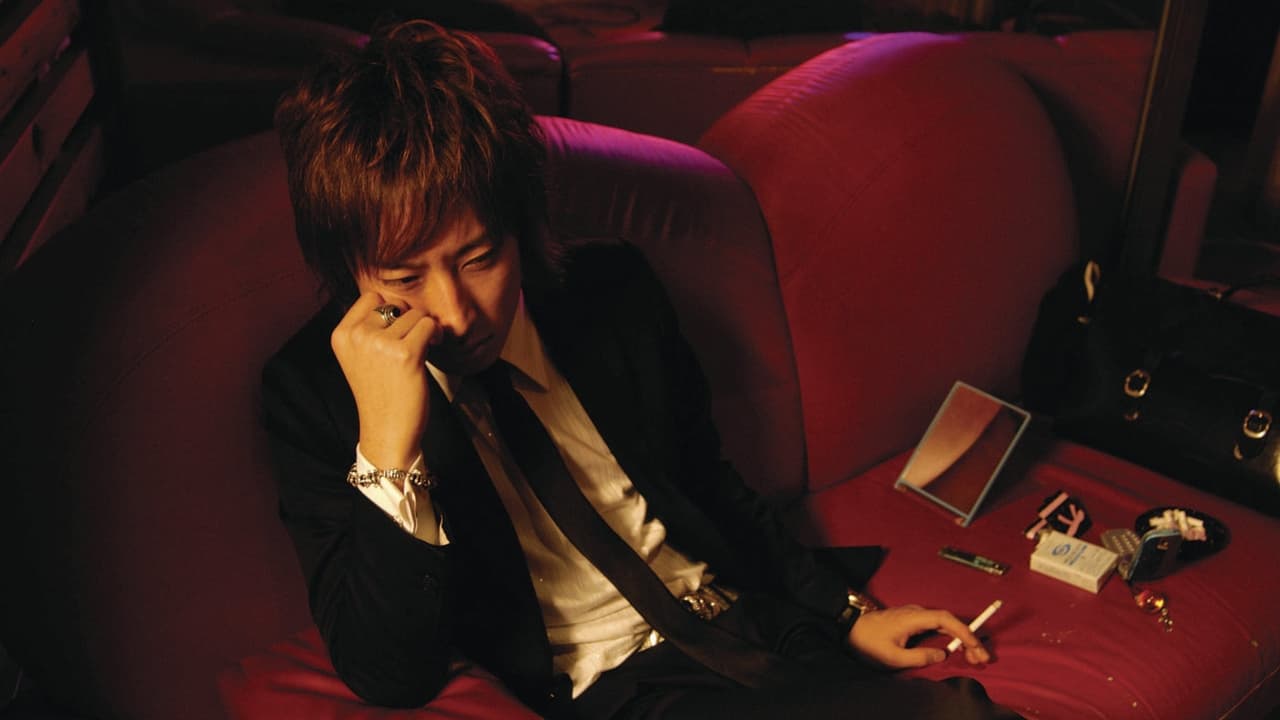

People are voting emotionally.
... View MoreGood concept, poorly executed.
... View MoreBest movie ever!
... View MoreIt’s not bad or unwatchable but despite the amplitude of the spectacle, the end result is underwhelming.
... View MoreAn amazing and tragic documentary about an unusual phenomenon in Japan. This film was released in 2006, so I wonder if the landscape has changed (ie, are host clubs that cater to women still popular?) I can't help but pity the nihilism in these participants' lives. I can see why many many men have quit working as hosts; they are essentially pimps--they send these girls out to prostitute themselves, then charm and wheedle the girls out of their hard-earned cash. These "hosts" act as therapists to help girls emotionally cope with the stress of being a sex worker only to send them back out to be exploited again. The girls are strung along on empty lies and lots of ambiguity. I'd thought that women in the sex trade would be smart and savvy enough to spot a liar a mile away, but some of these women seem so vulnerable and easily taken advantage of and pretty much everyone is lonely. I feel for them. I am aghast at the lies that each person tells themselves to maintain this horrible, vicious cycle.To any men that are thinking of picking up "tips" from this film: most women are not so naive as to let you string them along for months without a commitment. Most of us after a couple of breakups come to understand male psychology well--if you're not calling us to plan the next date, we start looking where the grass is greener.
... View MoreSometimes one can feel that one already knows everything there is to know about the world; but sometimes a film, such as this craftily revealing documentary, provides insights into another culture that seem wholly alien and strange. The subject of 'The Great Happiness Space' is Japan's host bar scene, where women pay for the company of men. At first, this intrigues because of the reversal of the sexes compared to the normal client-prostitute relationship. Soon, one makes new observations: that the hosts are very much "pretty boys", not the heaving hulks of unadulterated masculinity that are often held up as the female ideal, at least in the west; and secondly, that the women themselves are young and attractive, a long way from the stereotype of the average man who pays for women's services. Nor do they resemble the stereotype of Japanese women, quiet and demure; in the bars, they are drunken ladettes, and indeed, their relationships with their hosts seem more like those of groupies to rock stars than of punters to whores. In fact, in accordance with common opinions about female desire, but in contrast to normal practice in the sex industry, physical contact, while it often happens, is not what the women pay for; indeed, the men try to avoid it, as what keeps their clients coming back is the eternally unfulfilled promise of love. In one sense, the hosts are performing a con-trick, by selling this promise; but one also thinks, surely the women are willingly deluded. But when one learns the fantastic sums that the clients pay for this privilege, this phenomenon suddenly no longer seems so benign. But how can they afford to pay so much? The answer is, circularly, that most of the clients (at least, the high-spending ones), are also sex workers. In some ways, this makes sense: it explains their affluence, their craving for cathartic recreation, their floating of social norms, and also, perhaps, their willingness to pay for love not sex; yet in another sense, it seems wholly bizarre that those who practice the arts of illusion on their own clients should nonetheless fall so completely for the deceptions of their hosts. They also seem a little too like "nice girls" to be prostitutes, until it is implied that many actually take up prostitution to feed their habit; a healthier habit, perhaps, then heroin and the other drugs that prostitutes are stereotypically addicted to; but, it seems, one just as compelling.There's something deeply sad about all this, and yet it never feels sordid: the mutually sustained illusion hides the shockingly expensive transaction that lies behind the party, and the dream. And the girls, though surely headed for a fall, seem strangely calm and contented with their delusions, while their playboy hosts are, in the final scene, shown exhausted and hung-over, physically and perhaps morally exhausted by their work. And relating this scene to anything western seems very hard, even though it has arisen in response to universal urges. Truly, we live in a strange, varied, and tragic world.
... View MoreI don't know What movie that last commenter was watching, but it sure as hell wasn't this one. This is a depressing, depressing film, and you will NOT learn any sex tricks in this movie -- in fact, no one actually gets laid at these host clubs. Nor will you learn how to anything about pleasing a woman, nor anything about charm: these youngsters engage in a frightening deathlike ritual, where the traditional courtship rituals are endlessly repeated, completely emptied out of any spontaneity or novelty."I would die for Issei" -- one girl proclaims -- little wonder, since every single one of their actions seem to reach out for death.Is Japan the death intrinsic to modern life? The naiveté of more maddeningly superficial examinations of Japan (e.g. the insufferable Lost in Translation) attempt to delimit the borders of life and death in terms of the most superficial and ethnocentric terms. But, the power of documentary comes from the ultimate NEGATING of racial difference in search of a more fundamental ground for the determination of life and death -- and in the sympathy in which these characters are portrayed and the philosophical clarity in which these characters speak (The Japanese, introspective, sentimental, and highly educated, are naturally drawn towards a certain form of philosophy) we find the possibility of thinking the death of all civilizations.
... View MoreThe world of hosting is little known outside of Japan, that of glamorous host boys even less. Jake Clennell's mind-boggling documentary is so hypnotic that single young men may want to take notes, and those who are partnered do the same to learn better how to please the female psyche.The 'hosts' in any of ten exclusive clubs in Osaka only make money if they can be charming and engaging while selling champagne at $500 a bottle. Although there are maybe 100 host clubs, most of them provide female companions for light conversation, company, and laughter (not necessarily sex - which is generally provided from a number of different establishments). Issei, however, presides over a Cafe Rakkyo club, where glamorous host boys, not women, do the entertaining. They make beautiful young women laugh, smile and feel good about themselves - women who pay very handsomely for the pleasure. They party till they drop, women competing with each other for the host boys' attention by spending more money."For girls, we are products," says Issei. "We have fake love relationships," and he compares his job to that of Peter Pan, who took people to a world that doesn't exist. "We sell dreams - that's our job." We witness candid interviews with the host boys, including a new lad being interviewed for a job, and also a number of the good-looking young women who frequent the host bars. They confess to how they fall in love with Issei. He, in return, says how although he may have sex with the girls, he often tries not to if that's their aim, because afterwards they are more likely to 'dump him.' Some of these customers have been coming to the club for several years. They pay by the hour for the attention of one of the host boys at the 24hr party room, but he will often be in demand by several women at once. If a woman wants to speak to a host privately, there is a special chair at extra cost ($50). Issei earns about $50,000 a month. He says the thing that stops him earning more is that he cares about his clients and won't let them spend too much money just for the sake of it. He talks about 'healing' his customers Why do the girls come? "When I'm at a host club, I'm treated like a princess," says one. When they have been coming for a year or more, they often look to their chosen host for good advice. A girl never changes host within a club, so a long term 'relationship' of sorts develops. In this high-octane party atmosphere girls spend $1,000 or more in a single day. Issei says the highest was £40,000. "It's about how much girls want to financially worship me," he says. "He listens to me, he entertains me. That makes me really happy," she explains. We see some of the host boys out in the street persuading girls to come for a drink to the club. They have the charisma of TV personalities. The rapid fire conversation and banter is expertly aimed to make the girls smile and feel magnetically drawn to them. In a way it is quite selfless (if highly paid!) and Issei explains that if a host really develops personal needs towards a customer then he can't be effective as a host.One customer explains how she would be prepared to die for Issei. "To a certain extent, money can buy love," he tells the interviewer with a calm conviction that is slightly unnerving. Only later in the film do we find out more about the girls and how many of them play an equally dangerous game.The subject matter, the honesty and insight of the interviews, and the dervishlike way the winning lines are so hard to explain away, together with a very sure documentary hand that inserts no moral judgements, make The Great Happiness Space: Tale of an Osaka Love Thief an unforgettable piece of film-making.
... View More